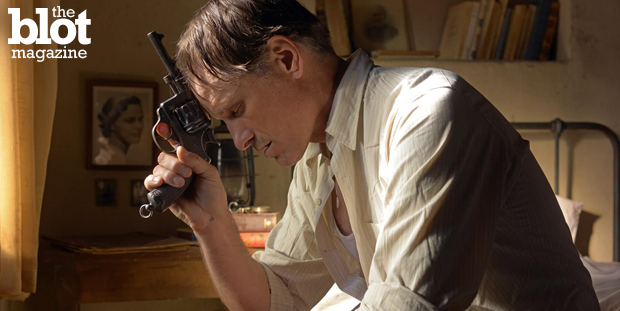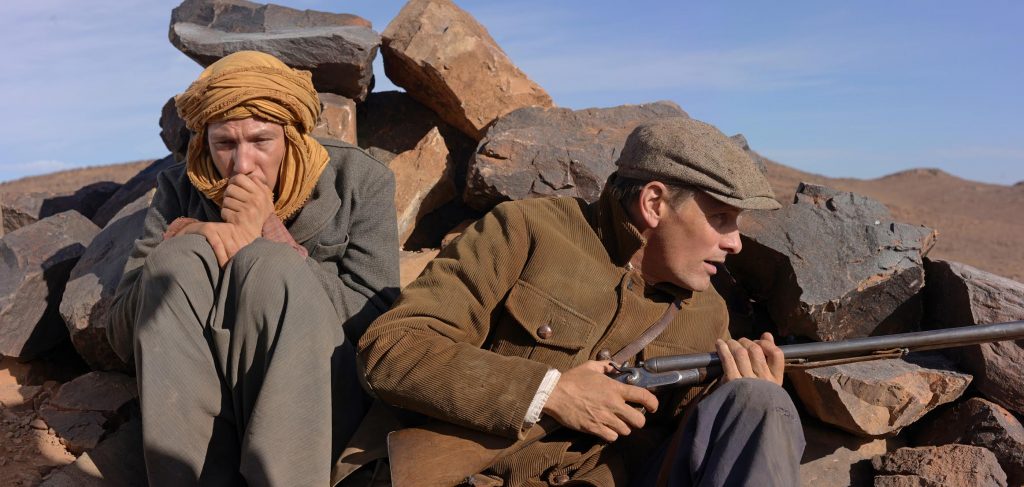Viggo Mortensen has been opting for less blockbusters like “The Lord of the Rings” in favor of small foreign films. He’s choosing stories that take place beyond the law, reminiscent of old classic westerns. Last year’s “Jauja” was described as “A father and daughter journey from Denmark to an unknown desert that exists in a realm beyond the confines of civilization.” And now we have “Far From Men,” based on the short story “The Guest” by Albert Camus, who favored lonely protagonists up against existential crises and moral conflicts. Camus himself was estranged from not only the country of his birth, Algeria, but also from his own nationality, French, so it’s little wonder this film adaptation echoes similar themes.
We’ve already seen Mortensen as a western gunslinger in “Appaloosa” with Ed Harris, a 2008 rehash of 1959’s “Warlock” starring Henry Fonda and Anthony Quinn. Mortensen’s chiseled face makes him a natural for such roles. In “Far From Men,” which takes place in the wind-swept Atlas Mountains of Algeria, Mortensen’s features reflect the same sculptured landscapes of the Algerian Maghreb, beautifully shot by cinematographer Guillaume Deffontaines.
Mortensen’s character Daru teaches local Algerian children to read in Arabic and French. The schoolhouse, which he lives next to, is right out of a Hollywood western, desolate and fragile amidst the mountainous terrain. The year is 1954, at the beginning of the Algerian Revolution and Muslim uprising. David Oelhoffen’s deliberate direction and pacing in these opening scenes highlight Daru’s unease, knowing his presence as a white man in Algeria is coming to an end. Even the children appear lost in this unforgiving land.
One day, local gendarme Balducci (Vincent Martin) arrives on horseback leading a bound Algerian farmer, Mohamed (Reda Kateb), who’s charged with killing his cousin. Daru is tasked with transporting the man to trial in Tinguit because Balducci must return to his post to defend against the worsening Algerian uprising. Daru wants nothing to do with leading a man to his death, the obvious outcome of a trial. Daru, it’s later revealed, is a skilled soldier himself, but has had enough of killing in the war and devoted his life to peace. Daru flatly refuses, yet has little choice when the prisoner is dumped on him and Balducci leaves with cryptic warnings of what will befall Daru if he doesn’t take the prisoner.
Daru reluctantly makes the prisoner at home for the night, feeds him and makes up a cot for him to sleep on, hence the title of Camus’ story “The Guest.” Through his compassion, Daru gets Mohamed talking and discovers he killed his cousin for stealing grain from Mohamed’s family. Though he killed the man to save his family, custom demands vengeance. Daru has little choice but to take Mohamed to his fate.
And so the story begins, the evolving relationship between Daru and Mohamed, two men of divergent nationalities who share a sense of responsibility in a harsh world and embark on a journey that bonds them. Writer/director Oelhoffen gives Camus’ story plenty of action. A lynch mob from Mohamed’s village waylays the duo, hoping to exact their own form of vengeance. But Daru, a skilled combat veteran, faces them down and runs them off. In order to avoid further encounters, the two men leave the road and take a tortuous route through the mountains. They get captured by Algerian guerrillas and then, while captive, are attacked by French troops sent to quell the Algerian uprising. The rugged landscape dwarfs the men and brings their struggles strangely into perspective.
Kateb is splendid as the battered Mohamed. We watch his physicality go from cowering abjectivity when the gendarme first drags him in, through small displays of trust and courage, to finally striding beside Daru at the end.
Mortensen’s sensitivity as Daru is a great contrast as he struggles with his moral convictions, yet never compromises them. He tells the French commander who ordered the Algerian guerrillas shot, “You killed men who were surrendering. That’s a war crime.” The commander explains he was just following orders to stop the revolution and take no prisoners. Daru doesn’t let him off the hook and says, “It was wrong to kill men who were surrendering.” The commander, who could have given Daru the same fate as the Algerians guerrillas, just takes the rebuke and walks away, leaving Daru and Mohamed to go on their way. Both Daru and Mohamed are outcasts from their nationalities, trying to maintain their humanity in a barren mountainous terrain and unforgiving circumstances.
The soundtrack by Nick Cave and Warren Ellis (“The Proposition”) is haunting, done mostly on woodwinds, as though blown out of the rocky hillsides by the wind itself, making the sound of a boot slipping on rocks or the far-off clip-clop of a horse’s hooves into sudden tension and helped make “Far From Men” one of my favorite movies so far in the 2015 Tribeca Film Festival.
“Far From Men” is currently available on VOD and digital platforms and will be out in select theaters Friday, May 1.
Watch the “Far From Men” trailer:
Dorri Olds is a contributing journalist for TheBlot Magazine.








One Comment
Leave a Reply